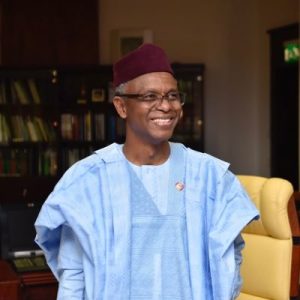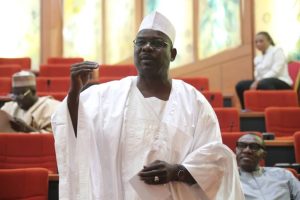In what was publicly described as a casual post-Sallah visit, a high-powered delegation of political heavyweights led by former Vice President Atiku Abubakar recently met with ex-President Muhammadu Buhari at his residence in Kaduna. Though pictures and videos from the visit conveyed a mood of brotherhood and celebration, the timing, the faces in attendance, and the political affiliations of those present have stirred waves of speculation among analysts, party insiders, and political observers.
At face value, the visit appeared innocuous. Atiku, joined by former governors Nasir El-Rufai (Kaduna), Aminu Tambuwal (Sokoto), Gabriel Suswam (Benue), Jibrilla Bindow (Adamawa), Achike Udenwa (Imo), and former Minister of Communications Isa Pantami, described it as a light-hearted reunion with an old political ally. El-Rufai even took to social media to humorously downplay the gathering, insisting it was nothing more than prayer, lunch, and mentorship—“not about politics.”
But Nigeria’s political terrain is rarely that simple. Context, history, and timing reveal deeper currents beneath this surface.
Unity or Realignment?

Atiku’s choice of words and the presence of former governors—many of whom are disenchanted members or former members of the All Progressives Congress (APC)—suggest the possibility of more than just a friendly visit. While both Atiku and El-Rufai deny any political motives, the overlap between their appearance and recent talks of an opposition realignment raises valid questions. The country is just two years away from the 2027 general elections, and murmurs of a potential mega-coalition among opposition figures are growing louder.
Even as El-Rufai swore it wasn’t about politics, his recent defection from the APC to the Social Democratic Party (SDP), along with reports of other ex-Buhari allies planning similar moves, makes the “lunch story” harder to digest for many.
The CPC Factor and Buhari’s Role
An essential piece of this political puzzle is the status of the defunct Congress for Progressive Change (CPC), the political platform that launched Buhari into national relevance before merging into the APC in 2013. Though CPC no longer exists as a standalone party, the ideological and personal loyalty among its core members remains strong.
Reports indicate that several prominent CPC veterans—disillusioned with the current APC leadership—are defecting to the SDP, prompting anxiety within the ruling party. This explains the flurry of visits to Buhari’s home—not just by opposition figures like Atiku, but also by APC’s National Chairman Abdullahi Ganduje and several APC governors, who reportedly pleaded with Buhari to rein in potential defectors.
Buhari, for his part, has publicly reaffirmed his loyalty to the APC, stating categorically, “I will never turn my back on the ruling party.” However, he also made it clear that others are free to make their own political choices. This careful balancing act has only added fuel to speculation that while Buhari may not openly campaign against the APC, he also may not stand in the way of his loyalists pursuing new political paths.
Ganduje’s Dismissal and APC’s Concerns

Attempting to douse the growing speculation, APC Chairman Abdullahi Ganduje dismissed the Atiku-led visit as a futile effort at political coalition-building. “It is a joint venture doomed to fail,” he told journalists, brushing aside the likelihood of a serious opposition threat. But Ganduje’s comments, rather than dispelling doubts, hint at the nervous undercurrents within the APC.
The ruling party currently controls 21 states and boasts the largest political machinery in West Africa. Still, its internal cohesion is showing signs of wear. If Buhari’s allies—many of whom are influential in the North—pull out en masse, the party’s dominance in 2027 could be significantly challenged, especially if a new alliance draws from multiple opposition platforms.
Ndume’s Warning: “Be Worried”

Perhaps the most candid insight came from Senator Ali Ndume, who, in a televised interview, cautioned President Tinubu to be “worried” if Buhari is not solidly in his corner. Ndume reminded Nigerians of Buhari’s enduring popularity among the Northern poor—what he referred to as a “cult-like” following. While Buhari may be out of power, the symbolic weight he carries, especially in the North, remains potent.
“If Buhari is not with you, you should be worried,” Ndume warned, emphasizing that every vote counts—and Buhari, despite no longer holding office, still commands loyalty from millions of “Talakawas.”
The 2027 Horizon: What Lies Ahead?
Nigeria’s political space is no stranger to realignments and coalitions, especially when an incumbent’s popularity begins to wane. The Atiku-Buhari meeting—joined by high-profile defectors and political veterans—cannot be taken at face value. While the official narrative emphasizes friendship, religious unity, and post-Sallah goodwill, political history teaches us that such meetings are often the prelude to strategic moves.
The real question is not whether a coalition is being planned, but how it will take shape, and who will lead it. Atiku has tried this before in various forms, with mixed results. El-Rufai, ever the tactician, may be eyeing a kingmaker role, or perhaps even more. Tambuwal, Pantami, Suswam, and others bring their own regional clout to any potential alliance.
If Buhari, whether tacitly or openly, signals approval of such a coalition—even while maintaining official ties to APC—it could be a game-changer in Nigeria’s power dynamics.
Conclusion: A Quiet Storm is Brewing
The Kaduna gathering may not have featured any political declarations, but it is, by all accounts, a loaded event. In Nigeria, politics is as much about symbolism and silence as it is about statements and slogans. The convergence of old allies, quiet defections, open denials, and whispered coalitions paints the picture of a political class in motion.
Whether this movement culminates in a formidable opposition or fizzles out in familiar factionalism will depend on what happens behind closed doors in the coming months. But one thing is clear: the road to 2027 has already begun—and Buhari’s Kaduna home may be one of its earliest checkpoints.



























































